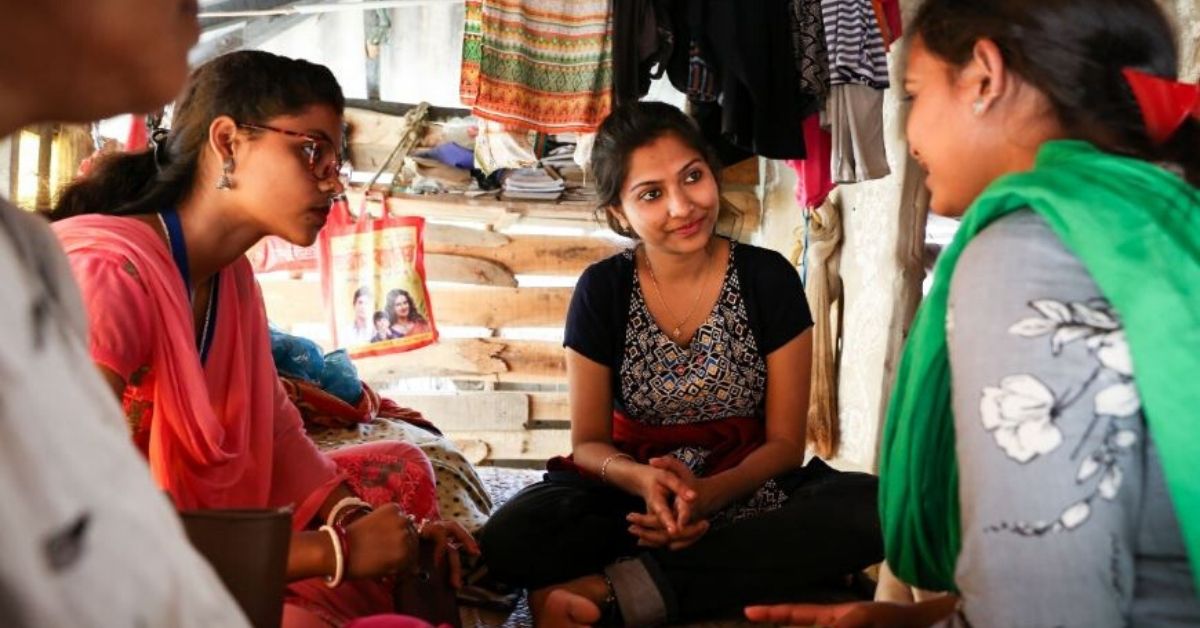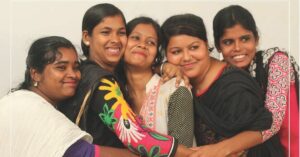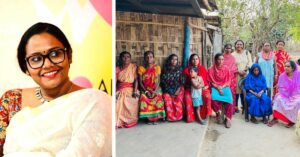This Father-Daughter Duo Have Rescued 2500 Minors, Women From Human Trafficking
Subhasree and Nihar Raptan are helping trafficking survivors who have to deal with the social stigma attached to their past after going through physical and psychological trauma of being forced into the sex trade.

Subhasree Raptan from West Bengal’s Sunderbans district, was merely 19 when she solved her first human trafficking case.
It was in 2013, and Subhasree, who was in her first year of college, learned about a minor who was forced into prostitution by her brother-in-law. The minor had reached out to Goranbose Gram Bikash Kendra (GGBK), an NGO founded by Subhasree’s father, Nihar Raptan.
“My father was involved in another case, and so, I was asked to keep in touch with the minor. The brothel abandoned her after she got pregnant, and her family refused to take her back,” Subhasree recalls in a conversation with The Better India.
“I was studying fundamental rights in my Political Science class, and here was this minor girl, whose rights to life and education were in danger,” she adds.
With Nihar’s help, she approached the local police and registered an FIR. Not stopping there, she admitted the young girl to a shelter home where she was introduced to a doctor and psychologist.
“Healing was slow, but it happened over time. Today, the survivor conducts awareness workshops on child trafficking in villages, schools, colleges, and universities and actively helps the NGO in rescue operations. She and her baby are healthy, and live in their own home,” smiles Subhasree.

Seeing the girl’s life improve was Subhasree’s biggest motivation to take forward her father’s project even if it meant giving up on her dreams of joining the IAS.
“I completed my Masters in English and joined my father’s NGO as a full-time employee. Along the way, I also completed a course in combating human trafficking from TISS, Mumbai, and Trafficking Prevention from NIPCCD, Assam. I also completed a special course to improve the NGO’s rehabilitation services, from the International Youth Centre, Delhi,” she mentions.
In the last 35-odd years, Subhasree and Nihar’s NGO has successfully rescued and rehabilitated 2,500 girls, including minors.
“I was preparing for Civil Services to serve people as an IAS officer. My goal still has not changed, except that now I serve people differently,” she says.
How It All Started

GGBK was started in 1985 in the aftermath of a devastating cyclone that hit Nihar’s village, Goranbose in 24 South Parganas district. Agricultural fields were damaged, and farmers were forced to migrate to other regions.
Nihar was among the very few graduates in his village, so he collaborated with a few friends and started post-cyclone relief work to help the village residents avail of government benefits. As they resolved issues of food and housing, another serious matter emerged.
Poverty had forced some families to trade their daughters or kidnap local girls for money. This was the beginning of human trafficking in the village, which eventually spread at the district level.
“A minor girl was trafficked to Mumbai via a train by a neighbour. Since we had helped the villagers in times of crisis, her mother approached me. Our aggressive investigation led us to this neighbour who later confessed to the horrendous crime, and the girl was rescued,” Nihar tells TBI.
Two years later in 1987, Nihar formally registered GGBK to prevent human trafficking and rescue and rehabilitate survivors.
Rescue Operations

Nihar and Subhasree undertake primarily two types of rescue operations—via networking and on-field.
They have developed a strong network in the district with the community, the local and state police force and NGOs working towards the same cause across India.
Working in unison with the community was the first step, the duo took to establish trust and a stronghold. “The biggest advantage of a community-led initiative is that the whole operation can be nipped in the bud. It is easier to catch the suspect while he is in the region,” shares Subhasree.
They trained a few local women in how to identify a business deal while being discreet, how to pass on the information to GGBK, how to stall a suspect till the police arrive, and so on.

Giving an insight into how people’s network helps, Subhasree says, “A few years ago, our informer got to know of a possible deal, and she immediately alerted other informers too. Around 4-5 people kept an eye on the suspected family. We contacted the police, stopped the deal and saved the girl.”
In another example, networking saved a mother-daughter duo from the district who were trapped and tortured in a Mumbai brothel.
“When we tried to contact the brothel owners, they warned us against any rescue operation and said if the mother was rescued, the daughter would be killed and vice-versa. We knew their family history and passed on the information to the Mumbai police and another city-based NGO. They were rescued safely.”
On-ground operations also work in a similar fashion where a tip from an informer is the starting point. GGBK volunteers then alert the police and conduct the mission. Meanwhile, lawyers and psychologists are kept on standby for remedial measures.
Since in majority of the cases, girls are transported to the city or states, it is vital to stop the victim and perpetrator before they leave the state. The NGO, thus, has to be vigilant on railways and within the communities.
To further its efforts, the NGO has also initiated Swayamsidhha, an awareness campaign for teachers, students, panchayat members and parents.

“We take workshops to inform them about the modus operandi of the trafficking chain in schools and tell students to inform us if they come across any suspicious movements. We have provided a box in 400 schools where staff and students can write without any hesitations,” says Subhasree.
Rehabilitation: Livelihoods & Legal Battles
Even after the human trafficking survivors are rescued and safely brought back home, other challenges await them.
They have to deal with the social stigma attached to their past after going through several nightmares and physical and psychological trauma of being forced into the sex trade.

Here’s where Bandhan Mukti, a survivor’s collective started by Subhasree comes in.
They provide support through counselling, litigation and compensation so that the survivors can rebuild their lives and livelihoods.
“If parents refuse to take their daughter back, we shift them to shelter homes. However, it is challenging for them to reintegrate into society. They don’t find jobs; men pass suggestive comments and psychological disorders further break their morale. But we try to help them through it, by getting them government benefits and compensation and providing them skill development training in tailoring and allied activities,” says Subhasree.

In the case of minors, due to their ‘dirty’ past, schools often refuse to give admission. So, Subhasree and her team of Bandhan Mukti approach the school authorities and convince them.
Human trafficking survivors also struggle with lodging FIRs, applying for compensation and demanding justice. “We have had cases where survivors are discouraged from approaching the court or filing FIRs to protect the name of the family. Sometimes, they even are threatened by the perpetrators. Never-ending legal procedures, the burden of providing proof and lack of trust in the legal system further worsen the situation,” Subashree explains.
The NGO has hired 3-4 lawyers who provide free counselling and support the survivors in legal procedures.
“Threat Don’t Stop Us”
“How can I be scared of someone who is threatening me to kill over the phone? My strategy is to never take the calls seriously and keep doing my work,” says Nihar who dedicated 35 years of his life to this noble cause.
The man has been attacked on numerous occasions, but it is a risk that he is willing to take if it means providing a life of dignity to girls who go through terrifying circumstances.
Over the years, he has learnt how to protect himself, but when his daughter expressed her wish to join him, there was some hesitation. “As a father, I may be protective of her, but when I see the work she is doing to keep so many women safe, it makes me proud.”
As for Subhasree, threats have become an everyday affair, “They are a validation that I am doing something right. I’m making an effort to break the social taboo that every survivor has to live with, and that gives me the power to continue the fight without getting scared,” she signs off.
All images are sourced from: GGBK/Facebook
Get in touch with GGBK here.
Also Read: For 30 Years, This Nagpur Man Has Rescued And Educated Children of Sex Workers!
(Edited by Gayatri Mishra)
Like this story? Or have something to share?
Write to us: [email protected]
Connect with us on Facebook and Twitter.
This story made me
- 97
- 121
- 89
- 167
Tell Us More
We bring stories straight from the heart of India, to inspire millions and create a wave of impact. Our positive movement is growing bigger everyday, and we would love for you to join it.
Please contribute whatever you can, every little penny helps our team in bringing you more stories that support dreams and spread hope.



















